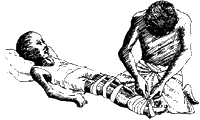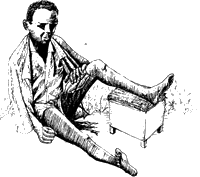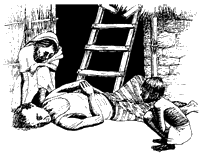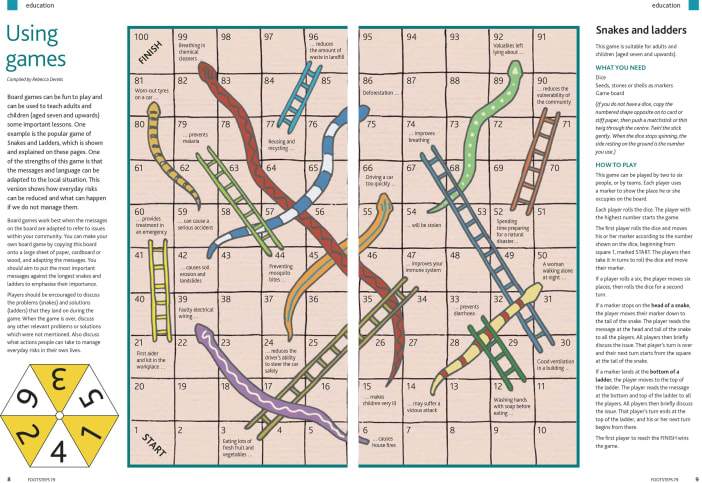Compiled by Isabel Carter, Bessie Cormack, Dr Elizabeth Swain, Sue Hanley and Sandra Michie.
All of us have probably experienced a real emergency at some time in our lives – situations when we wonder how best to help and no-one else nearby knows what to do. Most emergency situations will need medical help. However, what we do in the first few minutes before expert medical help arrives may be of huge importance. Making the wrong decisions may sometimes mean the difference between life and death. Sometimes there may be no medical help available for several hours. The following situations allow all of us to check on just how helpful we would be in an emergency…
1. While walking along, you discover a man lying by the side of the path. He is unconscious but seems otherwise unhurt. There is no-one else around.
Should you…
a) avoid touching him in case he has an infectious illness and run quickly to get help?
b) stay with him until he becomes conscious?
c) check his breathing and move him into a safe position in case he vomits and then get help?
2. When walking down a street, you hear screaming. A young child has fallen into the fire. Both hands and arms are obviously badly burnt.
Should you
a) cover the burnt skin with oil or ghee?
b) put the arms into a bowl of clean water?
c) wrap the arms in a clean cloth and take the child to a clinic?
3. A child has fallen out of a tree. One leg has obviously been broken and the bones can be seen through the damaged skin. Before carrying the child to a clinic,
Should you…
a) wrap the leg in a clean blanket?
b) gently push the bones back into place before wrapping the leg firmly to prevent movement?
c) cover the injury and tie the legs gently to a stick or board to prevent movement?
4. You find a man lying by the roadside. You find he is bleeding badly from two large bullet wounds in his leg. You have no transport.
Should you
a) press clean cloths directly into the wounds until the bleeding stops?
b) tie a tourniquet above the wounds to stop the bleeding?
c) try to remove the bullets?
5. Driving along the road, you discover an accident. A car has overturned, trapping two people underneath. They are unconscious and the engine is cool. There is a government clinic with a doctor, ten minutes’ drive away.
Should you…
a) with help, carefully turn the vehicle over to release the two people and then get help?
b) drive straight to the clinic and get the doctor?
c) check that both are still breathing and loosen any tight clothing, before driving to get a doctor?
6. A friend is repairing his roof. Suddenly the ladder breaks and he falls to the ground. He lands on his head in an awkward position and is unconscious. The nearest hospital is one hour’s walk away.
Should you…
a) straighten him into a comfortable position and check his breathing before running for help?
b) ensure that no-one moves him, check his breathing and then run for help?
c) lift him gently onto a door and take him to hospital?
7. A lady has been bitten on her leg by a poisonous snake. She is convinced she will die. The nearest hospital where they may have anti-snakebite venom is two hours’ drive away.
Should you…
a) reassure the lady that less than half of poisonous snakebites cause death and invite members of the church to pray with her?
b) apply a tourniquet above the bite and cut open the bite to suck out the poison?
c) wrap the leg firmly with cloth or bandages and attach a splint to prevent it moving – then set off to hospital?
How did you score?
Question 1 a) 0 b) 1 c) 3
Question 2 a) 0 b) 3 c) 1
Question 3 a) 0 b) 0 c) 3
Question 4 a) 3 b) 0 c) 0
Question 5 a) 0 b) 2 c) 3
Question 6 a) 0 b) 3 c) 0
Question 7 a) 2 b) 0 c) 3
If you scored 18 or more – you are an excellent person to have around in an emergency.
Scores of 12–18 mean that you have some understanding of how to help in emergencies but should learn more about first aid.
Scores of less than 12 mean that your efforts to help may do more harm than good. Learn about first aid procedures now!
How to do it right!
1. The unconscious man
When a person is unconscious remember the ABC of first aid – see 'The ABC of First Aid'. First check that the person is breathing and that their pulse is OK.
Move them into the recovery position which will prevent them from choking if they vomit. Then it is safe to run for help. By staying with the patient you would at least be able to stop them from choking but they may need urgent medical help.
2. The child in the fire
Burns should always be treated by immediate soaking in clean water (or other fluid – e.g.: milk, cola – if no water is available). This relieves the pain and reduces damage by cooling the skin. Never apply any cream or grease. Never try and pull off loose pieces of skin or clothing. Remove any rings (watches, shoes, etc) from the injured area before it begins to swell.
3. The broken leg
Fractures to limbs should be tied firmly to a support to prevent any movement before the patient is carried to a clinic or hospital. Never try and push bones back into place as you may cause a lot of damage to the flesh.










